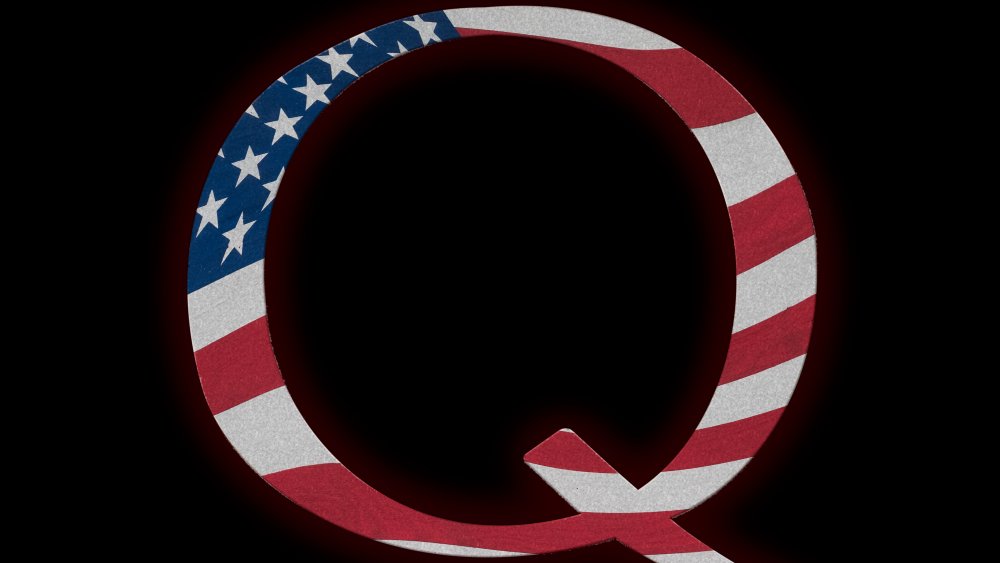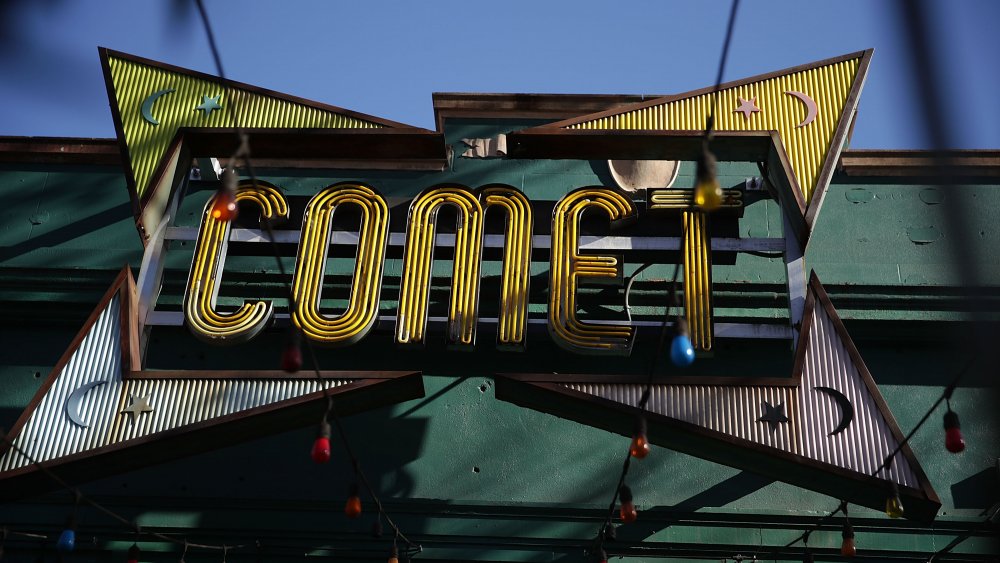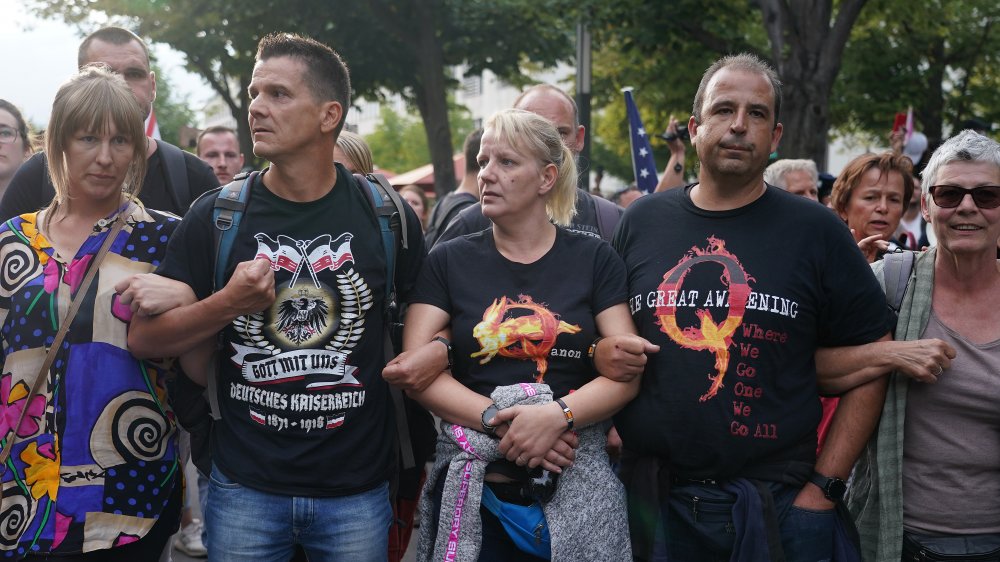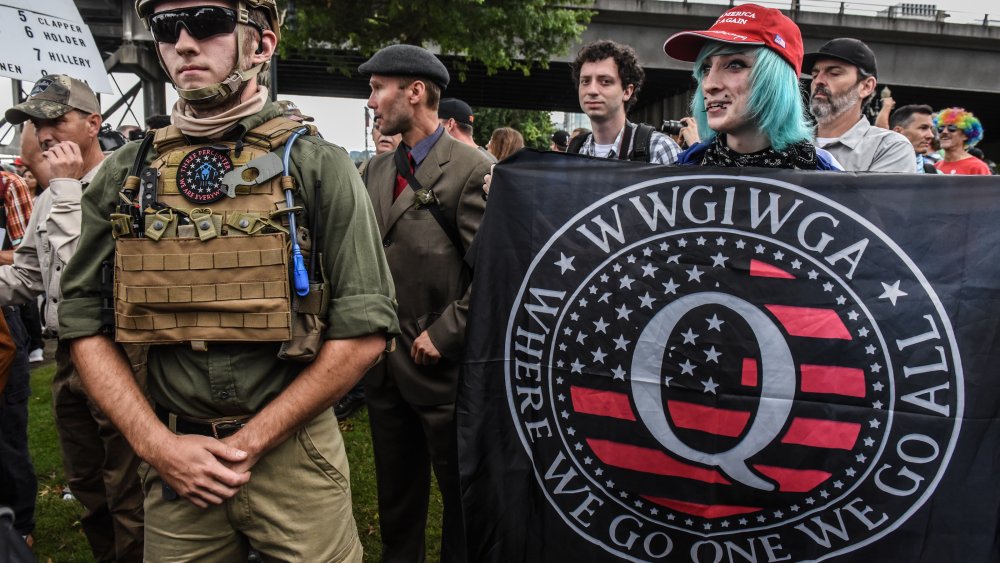The Frightening Conspiracy Theory That's Sweeping The US
In July, Lauren Boebert made the list of "Politicians Who Believe in Crazy Conspiracy Theories" for her outspoken belief in QAnon. Now Media Matters reports that there are currently 22 QAnon devotees running for congressional seats in this fall's general election. It's clear that QAnon has spread from the outer fringes to a more mainstream position, albeit one still somewhat fringe-y. But what is QAnon?
QAnon revolves around the revelations of "Q," an anonymous poster who began on 4chan, an English-language imageboard web site, with user-created posts — there's a variety of other topics, too — which later transitioned to 8chan and then 8kun. As the conspiracy developed, it exhibited even stronger White Supremacist tendencies. In these posts, Q poses as someone with insider knowledge about the child trafficking cabal that secretly manipulates the government. In her deep-dive into the subject for The Atlantic, Adrienne LaFrance pinpoints the date Q's entrance as October 28, 2017, when he announced that Hilary Clinton would be arrested on October 30. She wasn't, but that doesn't matter, because as QAnon grows, it consumes more and more conspiracy theories, and now could well symbolize the paranoid internet.
Its seeds
While Q began posting in October 2017, the narrative from which it cannablized its basis dated back to December 4, 2016. After reading about nefarious doings from several sources, Edgar Madison Welch drove hundreds of miles to search for children imprisoned by Hilary Clinton in Comet Ping Pong, a pizzeria in Washington D.C. When he found nothing, Time Magazine reports that he confessed "the intel on this wasn't 100 percent." We remember this as Pizzagate.
Already, we see the basic groundwork for QAnon's story: pedophilia and Hilary Clinton, the avatar of the deep state. What's the source? In 2017, Rolling Stone published "Anatomy of a Fake News Scandal," an in-depth investigation into the events that led to Welch's attempt to find exploited children in the basement of a pizza parlor that, as Vox reports, had no basement. Amanda Robb, the article's author, tracked possible seeds laid by misinformation campaigners on — guess where — 4chan, the idea being that real people would take these seeds and embellish them with realistic details, thus obfuscating their fabricated nature. As with QAnon, some were associated with the Trump campaign. One security expert Robb interviews suggests Russia as the culprit, exploiting preexisting divides and distrust between the political classes and the outsiders to create competing narratives and world views: "It is making you not trust the state. It's eroding the mandate of elected officials so that they can't govern properly."
Nothing is beyond QAnon
Since Q's first post, or "Q drops," as believers refer to them, hundreds have followed, sucking in various conspiracy theories that all exist as subcultures under the big tent of QAnon. Writing in The Guardian, Julia Carrie Wong defines QAnon as "a baseless internet conspiracy theory." She adds, "There are many, many threads of the QAnon narrative, all as far-fetched and evidence-free as the rest, including subplots that focus on John F. Kennedy Jr. being alive (he isn't), the Rothschild family controlling all the banks (they don't) and children being sold through the website of the furniture retailer Wayfair (they aren't)." What must be understood, however, is that a follower of QAnon doesn't have to subscribe to every conspiracy theory.
One vision shared by all of QAnon is that of an upcoming apocalypse — "The Great Awakening." The Week lists other one-liners: "the storm is coming," "nothing can stop what's coming," "enjoy the show." Such apocalyptic thinking appears whenever massive inequalities occur. To borrow the description given by Religion News Service, QAnon believers see themselves as Batman's chaotic Joker, but "[the] reality is more like Joaquin Phoenix's more recent Joker ... a lonely, beaten-down man who turns to senseless violence in order to have his own sense of meaning in a world devoid of any spiritual or moral grounding."
QAnon's significance
It would be tempting to brush off QAnon as just another conspiracy theory, along with the faked moon landings and "9/11 was an inside job." After all, a Pew Research Center survey conducted in March found that 76 percent of Americans knew nothing at all about QAnon, while only 3 percent said they have heard and read a lot about QAnon. So, it seems quite fringe.
Nevertheless, there are active political candidates who believe in this, and the ideology behind these candidates is authoritarian. Melissa Giran Grant writes for The New Republic that Rae Perkins, the Republican challenger for Oregon's senate seat, "[live-streamed] her commentary on the Portland protests on social media, praising law enforcement and calling the [incumbent] senator a 'traitor' and 'sellout.'" Despite concerns about a Deep State, QAnon cheers the Federal government, because they only worry about authoritarians who challenge the perceived status quo, not those who uphold it. As Travis View, a QAnon watcher and host of the QAnon Anonymous podcast, told Alexander Reid Ross for Haaretz, "[QAnon believes] the solution to the country's problems is a brutal authoritarian crackdown against Trump's enemies." What QAnon may eventually become is anyone's guess.



